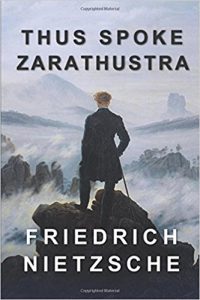


Before the crowd, however, we will not be equal.


'You higher men,' - so sputters the crowd - 'there are no higher men, we are all equal man is man, before God - we are all equal!'īefore God! - Now, however, this God has died. But if you will speak there, very well! The crowd, however, sputters 'We are all equal.' You higher men, learn this from me: In the market-place no one believes in higher men. With the new morning, however, there came to me a new truth: Then did I learn to say 'Of what account to me are market-place and crowd and crowd-noise and long crowd-ears!' In the evening, however, rope-dancers were my companions, and corpses and I myself almost a corpse. that it is the most useful English-language companion to Nietzsche’s ‘edifying’ and intriguing work.“When I came to men for the first time, then did I commit the hermit's folly, the great folly: I appeared in the market-place.Īnd when I spoke to all, I spoke to none. Lampert’s commentary and analysis of Zarathustra is so thorough and detailed. “This is a very valuable and carefully wrought study of a very complex and subtle poetic-philosophical work that provides access to Nietzsche’s style of presenting his thought, as well as to his passionately affirmed values. It makes a significant and original contribution to its field.”―Werner J. “This is the first genuine textual commentary on Zarathustra in English, and therewith a genuine reader’s guide. “A book of scholarship, filled with passion and concern for its text.”―Tracy B. Lampert’s persuasive and thorough interpretation is bound to spark a revival of interest in Zarathustra and raise the standards of Nietzsche scholarship in general.”―Daniel W. Insofar as it solves the riddle of Zarathustra in an unprecedented fashion, this study serves as an invaluable resource for all serious students of Nietzsche’s philosophy. Laurence Lampert’s chapter-by-chapter commentary on Nietzsche’s magnum opus clarifies not only Zarathustra’s narrative structure but also the development of Nietzsche’s thinking as a whole. The first comprehensive interpretation of Nietzsche’s Thus Spoke Zarathustra ―an important and difficult text and the only book Nietzsche ever wrote with characters, events, setting, and a plot.


 0 kommentar(er)
0 kommentar(er)
